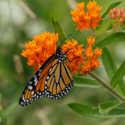Dave and Trish,
This was the first full podcast I had time to sit and listen to here on ATP and I loved it!

Thank you for covering milkweed and its importance to the monarch butterflies. I'm closer to being one of the people who do the 'fancy landscaping' than the 'wild landscaping' (and I still listen to/love your podcast), and I would love to have the Asclepias tuberosa in my landscaping

...but I'm especially concerned about the toxicity of the plant to dogs and children, so I had to hold off planting it.

While listening to your podcast, I had another tab open and I was looking up the different varieties as you were talking about them and it was neat to learn about varieties other than Asclepias tuberosa. I really liked the tropical milkweed (Asclepias Curassavica) and, as I was perusing the pictures of it on ATP, I was thinking how much it looked like Lantana; and then you, Dave, even commented on that, which I thought was great.

'Dallas Red' Lantana (although that's the first I've heard the cultivar name) is always one of my favorites at the nurseries and it makes me sad that neither lantana nor Asclepias Curassavica are winter hardy.

Ah well, it weren't for hardiness ruling some plants out for my area, I'd probably never be able to decide which plants I wanted most in my yard!

Going back to toxicity, though, one thing that I had hoped might have been discussed in the podcast is how toxic milkweed plants are, the symptoms of exposure to it, what to do in the event of contact (or ingestion) with people and pets, and whether or not some varieties are less toxic than others so that some of us, with less naturalized landscaping, would know if there is a variety that we could safely plant. I might try to google it at some point because now you have me very interested in milkweed again.
-DnD
